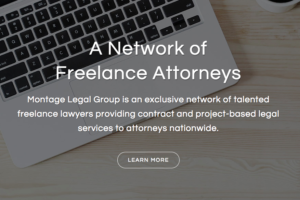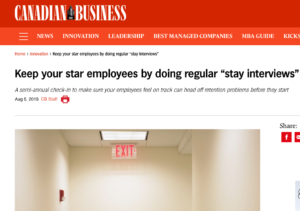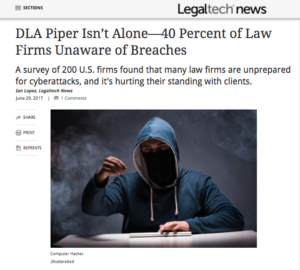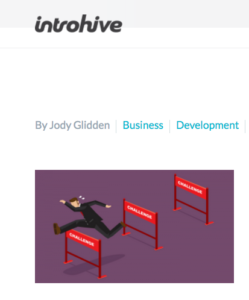Gerald A. Riskin's Blog, page 15
September 14, 2017
Help for Stressed-Out Lawyers
 Are you anxious? depressed? chronically stressed? Jeena Cho, who with Karen Gifford has co-authored a book for the American Bar Association entitled The Anxious Lawyer, has some reassuring news that may not come as much of a surprise: your mental state is common among lawyers.
Are you anxious? depressed? chronically stressed? Jeena Cho, who with Karen Gifford has co-authored a book for the American Bar Association entitled The Anxious Lawyer, has some reassuring news that may not come as much of a surprise: your mental state is common among lawyers.
In an article on their anxiouslawyer website, Jeena Cho argues that these mental conditions are attributable to “cognitive distortions” – statements we tell ourselves that are not actually true. Cho says that these misstatements are based on three basic misconceptions: 1) that we are not “enough”; 2) that “more is always better”; and 3) that “I must sacrifice myself and my well-being for others.”
Cho goes on to explore why each of these statements is counterproductive as well as being false. She and her co-author believe that mindfulness and meditation are the keys to less stressful and more productive law practices, and they offer guidance to those who are interested in helping themselves attain a more consistent state of calm.
I invite you to share your thoughts on this or any other matter related to the law, either in the comments section below or directly via email.
September 7, 2017
Microsoft’s Lawyers Told to Swap Billable Hours for Alternative Fee Strategies
According to an article on Quartz , Microsoft will require all of the law firms with which it works to move to a retainer or other billing approach for most legal matters, rather than billing by the hour, within two years.
, Microsoft will require all of the law firms with which it works to move to a retainer or other billing approach for most legal matters, rather than billing by the hour, within two years.
As the article points out, the billable hour may be traditional and standard procedure for law firms, but it is costly for clients and inconvenient for lawyers. Billing by the hour, and especially the practice of “rounding up” all tasks no matter how small into six-minute blocks (or whatever the metric may be), is often the source of unhappiness and disagreement between lawyers and their clients.
The demand that lawyers move away from the billable hour by a major corporation like Microsoft, which – as the article points out – “spends hundreds of millions of dollars on litigation annually” and is therefore in the driver’s seat when it comes to its legal services, may well herald a major shift across the board.
Are you prepared to offer alternative fee structures to your clients if they want the same treatment as Microsoft – or to get ahead of the game by offering creative fee options to your major clients before they start demanding them?
Let me know your thoughts on this or any other matter related to the law, either in the comments section below or directly via email.
August 28, 2017
The Legal Profession: Will It Be Caught in the Headlights?
 On the blog site of the Montage Legal Group, Kandy Williams – an attorney in Orange County CA – evaluates the recently published report of the ABA Commission on the Future of Legal Services and wonders whether the legal profession in the U.S. is “on the cusp of Uber-like disruption.”
On the blog site of the Montage Legal Group, Kandy Williams – an attorney in Orange County CA – evaluates the recently published report of the ABA Commission on the Future of Legal Services and wonders whether the legal profession in the U.S. is “on the cusp of Uber-like disruption.”
“Many of the Commission’s findings paint a bleak picture of the legal landscape,” Williams writes. Not only do the poor and many middle-income Americans have no access to legal services, but “lawyers would have to provide over 900 pro bono hours per year in order to make a measurable dent in assisting all households with legal needs.” The state of legal services in the U.S. is contributing to delays, disruptions, and backlogs in the courts.
Williams goes on to list some of the Commission’s recommendations, including greater diversity and inclusion in the legal profession, and an overhaul of the justice system. The report is particularly critical of the fact that lawyers in general lag far behind other professions when it comes to technology, and that the profession is so resistant to change. It is at this intersection that Williams wonders whether “like taxi drivers caught in the headlights of Uber,” BigLaw may find itself confronted by a new generation of legal innovators who bring entirely new approaches to the practice of law. One of these is the “accordion company” like the Montage Legal Group of freelance attorneys, “that provide[s] networks of trained, experienced lawyers to law firms to shore up firms’ staffing needs.”
Williams points out that there has been criticism of the Commission’s report, and that the ABA has not yet adopted it. Nonetheless, the report – like Williams’s article – raises issues that cannot be ignored.
I welcome your thoughts on this or any other matter related to the law, either in the comments section below or directly via email.
August 17, 2017
Law Firm Pairs with Cybersecurity Company to Help Businesses with Data Breaches
 Bloomberg Law reports that the law firm Jackson Lewis has formed an arrangement with the identity-theft and data-breach management firm Merchants Information Solutions to provide legal advice to businesses that have experienced data breaches.
Bloomberg Law reports that the law firm Jackson Lewis has formed an arrangement with the identity-theft and data-breach management firm Merchants Information Solutions to provide legal advice to businesses that have experienced data breaches.
Gayle Cinquegrani at Bloomberg quotes Merchants’ vice president of marketing, Robert Ward, who says this is “the first program in the country” to offer legal services as part of “a bundled program” in data-breach response.
“These small businesses don’t have the financial resources to reach out to a firm,” Ward says.
Cinquegrani reports that Merchants “will pay up to a specified amount for its subscribers when legal assistance is necessary. After that, a subscriber can choose to pay for more legal services.”
With rapidly developing legal implications that vary by country and even by region, the need for legal advice for those who experience data breaches is likely to be a growth area in the legal-services field. Offering to partner with cyber-breach management firms to offer legal assistance as part of a “bundle,” or via another fee system, may become a popular option for connecting businesses with the legal advice they need.
Let me know your thoughts on this or any other matter related to the law, either in the comments section below or directly via email.
August 10, 2017
Could Regular Interviews Help Law Firms Retain Valuable Staff?
 A brief article in Canadian Business suggests a way that businesses and professional companies like law firms can help to identify areas of concern among valuable legal and support staff before they lead to major problems.
A brief article in Canadian Business suggests a way that businesses and professional companies like law firms can help to identify areas of concern among valuable legal and support staff before they lead to major problems.
The article is based on a book co-authored by Beverly Kaye and Sharon Jordan-Evans. In Hello Stay Interviews, Goodbye Talent Loss, the authors suggested that interviewing “star employees” on a regular basis can help companies identify and then work to resolve issues that are standing in the way of success for these employees. The article also suggests some questions that might be part of such interviews, such as “What do you want to learn in the next year?”
Although the book is intended for business managers in general, the strategy would find a valuable place in the toolkits of law firms that are determined to keep their best and brightest lawyers and support staff working for them – rather than looking for greener fields with the competition.
As always, I welcome your thoughts on this or any other matter related to the law, either in the comments section below or directly via email.
August 3, 2017
Cybersecurity Essential to Law Firms
 In an article on law-firm cybersecurity that appeared in LawTech News in June 2017, Ian Lopez said: “According to a recent report from IT security provider LogicForce, hacking attempts were made on over 200 U.S. law firms between 2016 and 2017, 40 percent of which didn’t even know that they had been breached.”
In an article on law-firm cybersecurity that appeared in LawTech News in June 2017, Ian Lopez said: “According to a recent report from IT security provider LogicForce, hacking attempts were made on over 200 U.S. law firms between 2016 and 2017, 40 percent of which didn’t even know that they had been breached.”
Lopez also repeated a warning from Timothy Murphy, president of Thomson Reuters Special Services, who said at a recent law-firm cybersecurity panel that “This is the most significant threat this country, businesses and law firms face.”
It is easy to assume that it is only large, multinational firms that are vulnerable to cyberattacks – like DLA Piper, whose phones and computers on several continents were out of commission for several days following an attack in early June. However, perpetrators of phishing, ransomware and other hacking strategies are as likely to set their sights on smaller businesses as on major corporations.
Cybersecurity experts agree that instituting basic “cyber hygiene” does not need to be costly or time-consuming, but that it is increasingly essential. I encourage readers of this blog to read Lopez’s article and to institute safe internet protocols before it is too late – and then to actually adhere to the guidelines they set up (90% of firms surveyed by LogicForce did not follow their own cybersafety guidelines!). It is also sound strategy to reassure your corporate clients that you take cyber security seriously – and to consider incorporating their protocols into your strategies as well.
I would be pleased to know your thoughts on this or any other issue relating to the practice of law. You can contact me either through the comments below or directly via email.
July 27, 2017
Literary Essay Assignment as a Recruitment Tool?
 Bloomberg’s Big Law blog reports on an intriguing hiring tactic recently deployed by the intellectual property boutique Fisch Sigler LLP of Washington, D.C.
Bloomberg’s Big Law blog reports on an intriguing hiring tactic recently deployed by the intellectual property boutique Fisch Sigler LLP of Washington, D.C.
Applicants for the position of associate at the firm were invited to submit an essay on the subject of “Whether Nobel Prize winning novelist Saul Bellow deserved his 1976 Nobel Prize for Literature,” along with the rest of their applications.
The firm’s ad for the position read in part, “We are looking for a lawyer who savors persuasive writing as the best part of the job. Is this you?”
Christopher Brown, the author of the article, reports that Fisch Sigler’s search for a “literary wordsmith” led to a number of interesting discussions during interviews, and was ultimately successful. Similarly unusual tactics are now being used to fill other positions at the boutique firm.
Brown points out that small firms with limited practices become far more vulnerable than do large firms when they hire even one person who doesn’t meet their needs. Fisch Sigler LLP has taken a creative approach that may help to reduce their particular risks when it comes to making hiring decisions.
Let me know your thoughts on this or any other issue relating to the practice of law. You can contact me either through the comments below or directly via email.
July 20, 2017
Facing and Overcoming Law Firm Business-Development Challenges
 I was pleased to have been invited recently to contribute my thoughts to an article by Jody Glidden, cofounder and CEO of Introhive. Introhive provides relationship intelligence automation (RIA) support to law firms and other professionals who are using customer relationships management (CRM) platforms.
I was pleased to have been invited recently to contribute my thoughts to an article by Jody Glidden, cofounder and CEO of Introhive. Introhive provides relationship intelligence automation (RIA) support to law firms and other professionals who are using customer relationships management (CRM) platforms.
Jody asked me to talk about “the most critical business-development mistakes law firms are making today, the most important trends that are shaping the legal marketplace, and how the smartest law firms are responding.”
First I explained why it is that today, more than ever before, law firms must attend to business-development and client-retention issues: “The equation has shifted. Until recently, law firms had more power than clients. Now clients hold the power. Simply put, law firms are competing in a tougher climate.”
I then went on to talk about how this challenge can be addressed. I explained, for example, that many law firms waste time and energy by confusing “business development” with “marketing.” I also told him why business-development training in law firms should include mentoring by lawyers who have proven track records at attracting new business.
I hope you will find Jody’s article of value. As always, I welcome your thoughts on this and other issues relating to the law. You can contact me either through the comments below or directly via email.
July 13, 2017
Lessons from HBO’s Game of Thrones about Email Security
 A recent article in The Verge describes the challenges faced by the wildly popular Game of Thrones series on HBO when it comes to protecting secrecy around the plots of future episodes. Among the steps the show has taken to address these privacy challenges is two-step verification of emails, a strategy any industry or profession that deals with secure matters on a regular basis would be wise to consider for its own purposes. Law firms, for example.
A recent article in The Verge describes the challenges faced by the wildly popular Game of Thrones series on HBO when it comes to protecting secrecy around the plots of future episodes. Among the steps the show has taken to address these privacy challenges is two-step verification of emails, a strategy any industry or profession that deals with secure matters on a regular basis would be wise to consider for its own purposes. Law firms, for example.
Game of Thrones‘ zealous fans have done everything they can to gain access to plot twists and turns in advance of broadcasts, from sneaking onto sets in the guise of legitimate photographers to launching camera-equipped drones to spy on film locations.
Now, along with reducing the number of people who are given any access to scripts at all, and using code words on the set, HBO has instituted a policy of communicating electronically about episodes only with cast members who have set up two-factor authentication on their email accounts.
“Two-factor authentication” or “two-step verification” is the term used to describe the requirement instituted by email providers, among others, that in addition to a passcode, users provide a second piece of information – one that only they will know – to identify themselves. Many email providers now require, for example, that users input a code number sent to their cell phone before they can log on.
If HBO is requiring two-step authentication to help protect its scripts from a public salivating for spoilers, perhaps it is time that law firms – who deal with far more life-altering security-related issues every day than plot twists – should make such email restrictions part of their standard practice, too.
I welcome your thoughts on this and other issues relating to the law. You can contact me either through the comments below or directly via email.
July 6, 2017
Gary Kasparov: “Work with – Don’t Fear – Intelligent Machines”

Gary Kasparov at TED Talks
In a humorous and entertaining, but also thought-provoking, TED Talk, Gary Kasparov recounts his historic confrontation with IBM’s “Deep Blue” in 1997: the never-to-be-forgotten day when the world champion chess player was beaten at his own game by a computer.
Kasparov goes on to talk about the value of the capacities – such as passion and the ability to dream – that only humans possess. He believes that by working with machines, humans can help to create “more useful intelligence.” The problem? Too many of us are afraid of AI and the challenges it presents.
“We must face our fears if we want to get the most out of technology,” Kasparov says, “and we must conquer those fears if we want to get the best out of humanity.”
Check out this amazing video and let me know what you think.
As always, I welcome your thoughts on this or any other matter related to the law, either in the comments section below or directly via email.



